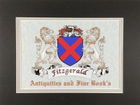
1849 Abolitionist, Works of the Reverend John England
Similar Sale History
View More Items in Tableware & BarwareRelated Tableware & Barware
More Items in Tableware & Barware
View MoreRecommended Home & Décor
View More






Item Details
Description
1849 Abolitionism The Works of the Right Reverend John England
Complete 5 Volume Set
The works of the Right Rev. John England, first bishop of Charleston; collected and arranged under the advice and direction of his immediate successor, the Right Rev. Ignatius Aloysius Reynolds and printed for him.
Complete 5 Volume set; these were rebound by an Abbey; These were part of an Abbey library and they have the usual stamps and stickers on the inside and outside of the books; there is foxing on the inner pages
In 1830 he established in Charleston the Sisters of Our Lady of Mercy \"to educate females of the middling class of society; also to have a school for free colored girls, and to give religious instruction to female slaves they will also devote themselves to the service of the sick\". Subsequently their scope was enlarged, and branch houses were established at Savannah, Wilmington, and Sumter. In 1834 he further promoted education and charity by the introduction of the Ursulines.
In 1835 Rt. Rev. William Clancy arrived from Ireland as the coadjutor of Bishop England, but, after a year\'s dissatisfied sojourn, he requested and obtained a transfer to another field. Bishop England had originally asked for the appointment of the Rev. Dr. Paul Cullen, then rector of the Irish College, Rome (afterwards the first Irish cardinal), as his coadjutor.
A striking phase of Bishop England\'s apostolic character was manifested in his spiritual care of African Americans. He celebrated an early Mass in the cathedral for them every Sunday and preached to them at this Mass and at a Vesper service. He was accustomed to deliver two afternoon sermons; if unable to deliver both, he would disappoint the rich and cultured who flocked to hear him, and preach to the poor. In the epidemics of those days he exhibited great devotion to the sick, while his priests and the Sisters of Mercy volunteered their services in the visitations of cholera and yellow fever. His personal poverty was pitiable. He was known to have walked the streets of Charleston with the bare soles of his feet to the ground. Several times the excessive fatigue and exposure incurred in his visitations and ministrations prostrated him, and more than once he was in danger of death. In 1832 he was appointed Apostolic Delegate to Haiti.
Abolitionism
England operated in a heavily Protestant city. During the 1820s-1830s, he defended the Catholic minority against nativist prejudices. In 1831 and 1835, the bishop established free schools for black girls and boys. In 1835, riled by the propaganda of the American Anti-Slavery Society, a mob raided the Charleston post office and the next day turned its attention to England\'s school for \'children of color.\' Alerted, England led Charleston\'s Irish Volunteers to protect the school. Yet soon after this, when all schools for \'free blacks\' were closed in Charleston, England acquiesced, thus divorcing Catholicism in Charleston from abolitionism.
Legacy
In the interests of his impoverished diocese he visited the chief towns and cities of the Union, crossed the ocean four times, sought aid from the Pope, the Propaganda, the Leopoldine Society of Vienna, and made appeals in Ireland, England, France, Italy, wherever he could obtain money, vestments, or books. In 1841, he visited Europe for the last time. On the long and boisterous return voyage there was much sickness, and he became seriously ill through his constant attendance on others. Though very weak, notwithstanding, on his arrival in Philadelphia, he preached seventeen nights consecutively, also four nights in Baltimore. With his health broken and his strength almost exhausted, he promptly resumed his duties on his return to Charleston, where he died.
Most of his writings were given to the public through the columns of the United States Catholic Miscellany, in the publication of which he was aided by his sister. His successor, Bishop Reynolds, collected his various writings, which were published in five volumes at Baltimore, in 1849. A new edition, edited by Archbishop S.B. Messmer of Milwaukee, was published at Cleveland in 1908.
Bishop England High School, founded in Charleston, South Carolina in 1915, was named in his honor.
Condition
Buyer's Premium
- 20%
1849 Abolitionist, Works of the Reverend John England
Shipping & Pickup Options
Item located in Powhatan, VA, usPayment




















![Two serving trays: Two works: A Gildea and Walker "Melbourne" serving tray Circa February 1882, designed 1881; England Impressed: Gildea & Waker / 2/82 [date] / Ivory; with blue overglaze Gildea & Walker backstamp a](https://p1.liveauctioneers.com/255/249241/129369167_1_x.jpg?height=310&quality=70&version=1653177989)


















![[POTTERY]. British Anti-Napoleon Cartoon Jug. [England, ca....: [POTTERY]. British Anti-Napoleon Cartoon Jug. [England, ca. 1812]. An exceptional political jug. A hilarious horse carries Napoleon and his Army on the run from Russia and anticipates his eventual rec](https://p1.liveauctioneers.com/928/328184/176813310_1_x.jpg?height=310&quality=70&version=1714496988)







































